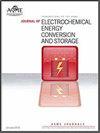Comprehensive Performance Evaluation Strategy for Power Battery System based on Dynamic Weight
IF 1.9
4区 工程技术
Q3 ELECTROCHEMISTRY
Journal of Electrochemical Energy Conversion and Storage
Pub Date : 2023-04-11
DOI:10.1115/1.4062287
引用次数: 0
Abstract
New energy vehicles are the effective solution to solve the situation of carbon neutrality with carbon peaking in China. The power battery system is the key component of new energy vehicles, and its performance is directly related to the safety and cruising range. Since the performance of the battery system is affected by factors such as electrical contact stability, voltage and current characteristics, and its own temperature, its full life cycle performance cannot be comprehensively evaluated, resulting in the inefficient prediction and protective measures. In this paper, the electrical contact stability evaluation index is proposed by studying the relationship between the electrical contact stability and the fluctuation characteristics of the reversed equilibrium potential. The parameters including electrical contact stability, polynomial-based status of charge (SoC), the status of health (SoH), the status of consistency, as well as battery system temperature constituted the performance matrix of the battery system. A comprehensive performance evaluation method of power battery system based on dynamic weight is designed with normalized classification. Finally, the cyclic charge-discharge test experiment under the vibration status were carried out to verify the effectiveness of the method. The result showed that the method can characterize various functions and provide an intuitive and detailed evaluation for the safety prediction of battery system.基于动态权重的动力电池系统综合性能评价策略
新能源汽车是解决中国碳中和和碳调峰局面的有效途径。动力电池系统是新能源汽车的关键部件,其性能直接关系到汽车的安全性和续航里程。由于电池系统的性能受电接触稳定性、电压电流特性、自身温度等因素的影响,无法对其全生命周期性能进行综合评价,导致预测和保护措施效率低下。本文通过研究电接触稳定性与反平衡电位波动特性之间的关系,提出了电接触稳定性评价指标。电接触稳定性、基于多项式的充电状态(SoC)、健康状态(SoH)、一致性状态以及电池系统温度等参数构成了电池系统的性能矩阵。设计了一种基于归一化分类的动力电池系统动态权重综合性能评价方法。最后进行了振动状态下的循环充放电试验,验证了该方法的有效性。结果表明,该方法可以表征各种功能,为电池系统的安全预测提供直观、详细的评价。
本文章由计算机程序翻译,如有差异,请以英文原文为准。
求助全文
约1分钟内获得全文
求助全文
来源期刊

Journal of Electrochemical Energy Conversion and Storage
Engineering-Mechanics of Materials
CiteScore
4.90
自引率
4.00%
发文量
69
期刊介绍:
The Journal of Electrochemical Energy Conversion and Storage focuses on processes, components, devices and systems that store and convert electrical and chemical energy. This journal publishes peer-reviewed archival scholarly articles, research papers, technical briefs, review articles, perspective articles, and special volumes. Specific areas of interest include electrochemical engineering, electrocatalysis, novel materials, analysis and design of components, devices, and systems, balance of plant, novel numerical and analytical simulations, advanced materials characterization, innovative material synthesis and manufacturing methods, thermal management, reliability, durability, and damage tolerance.
 求助内容:
求助内容: 应助结果提醒方式:
应助结果提醒方式:


